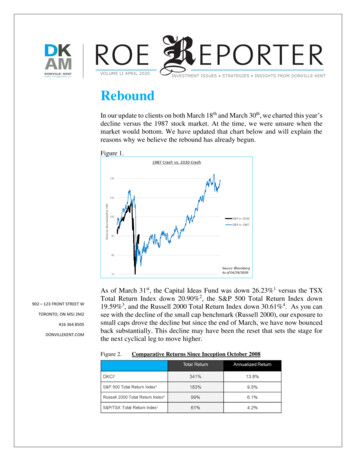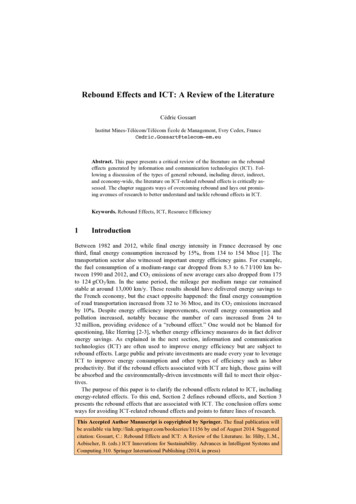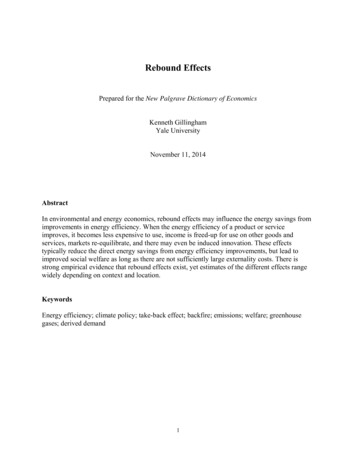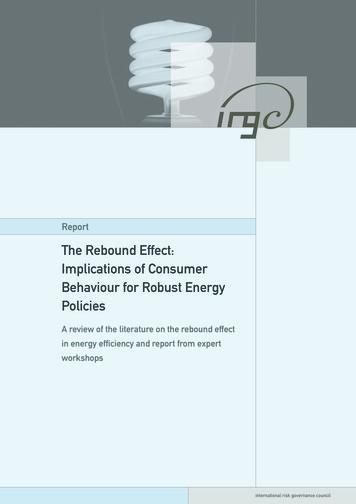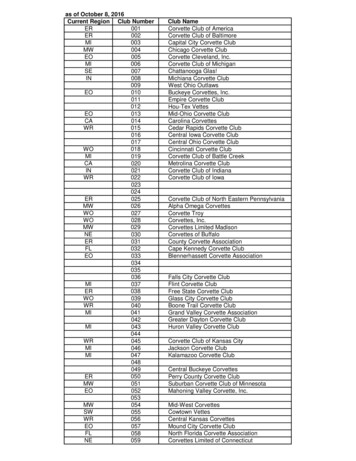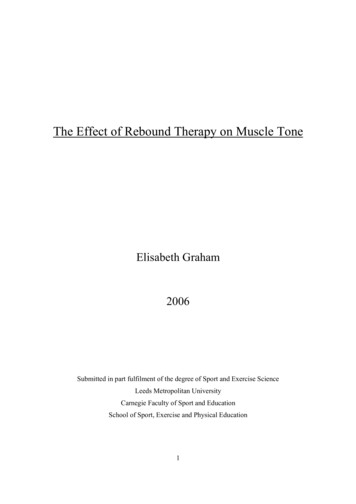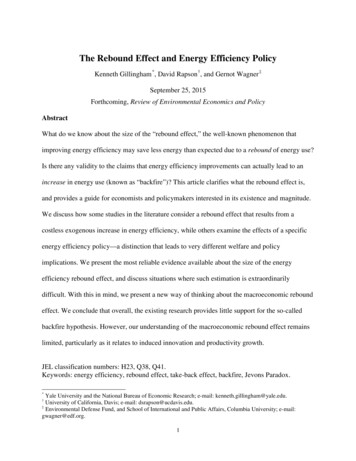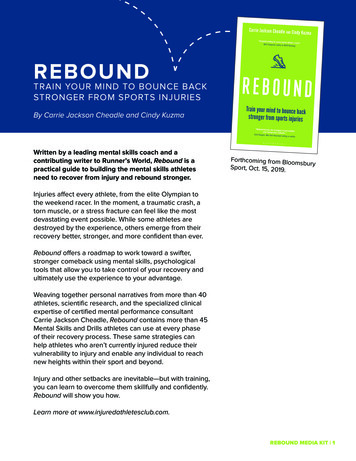
Transcription
REBOUNDTRAIN YOUR MIND TO BOUNCE BACKSTRONGER FROM SPORTS INJURIESBy Carrie Jackson Cheadle and Cindy KuzmaWritten by a leading mental skills coach and acontributing writer to Runner’s World, Rebound is apractical guide to building the mental skills athletesneed to recover from injury and rebound stronger.Forthcoming from BloomsburySport, Oct. 15, 2019.Injuries affect every athlete, from the elite Olympian tothe weekend racer. In the moment, a traumatic crash, atorn muscle, or a stress fracture can feel like the mostdevastating event possible. While some athletes aredestroyed by the experience, others emerge from theirrecovery better, stronger, and more confident than ever.Rebound offers a roadmap to work toward a swifter,stronger comeback using mental skills, psychologicaltools that allow you to take control of your recovery andultimately use the experience to your advantage.Weaving together personal narratives from more than 40athletes, scientific research, and the specialized clinicalexpertise of certified mental performance consultantCarrie Jackson Cheadle, Rebound contains more than 45Mental Skills and Drills athletes can use at every phaseof their recovery process. These same strategies canhelp athletes who aren’t currently injured reduce theirvulnerability to injury and enable any individual to reachnew heights within their sport and beyond.Injury and other setbacks are inevitable—but with training,you can learn to overcome them skillfully and confidently.Rebound will show you how.Learn more at www.injuredathletesclub.com.REBOUND MEDIA KIT 1
ABOUT THE AUTHORSCARRIE JACKSON CHEADLE lives in NorthernCalifornia and is a mental skills coach and certified mentalperformance consultant through the Association for AppliedSport Psychology. She is author of the book On Top of YourGame: Mental Skills to Maximize Your Athletic Performance(Feed the Athlete Press, 2013). A popular source formedia, Carrie has been interviewed for publications suchas Men’s Fitness, Women’s Health, Outside Magazine,Shape Magazine, Runner’s World, Bicycling Magazine, andHuffington Post.Carrie Cheadle,M.A., edtheathlete@feedtheathlete2 REBOUND MEDIA KITCarrie received her bachelor’s degree in psychologyat Sonoma State University, California and her master’sdegree in sport psychology at John. F. Kennedy University,California. She has been teaching and supervising mastersstudents in the sport psychology program at that sameuniversity since 2006. Carrie consults with athletes of allages and at every level, from recreational athletes, highschool and collegiate athletes, to elite and professionalathletes competing at national and international levels.In addition to being known for her expertise in sportsperformance and psychological recovery from injury, she isalso one of the foremost experts specializing in mental skillstraining for athletes and exercisers with type 1 diabetes,and is the director of the Mental Skills Training Programfor Diabetes Training Camp. Carrie has her own personalcommitment to lifelong fitness and when she isn’t workingwith athletes, you might find her running on a trail, playingguitar, or hitting the slopes on her snowboard.
CINDY KUZMA is a Chicago-based journalist with aspecialty in fitness and health, a contributing writer atRunner’s World magazine, and co-author of SuperfoodSwap. She earned her master’s degree from NorthwesternUniversity’s Medill School of Journalism and has spentthe past 15 years writing for national print and onlinepublications, including Men’s Health, Women’s Health,Prevention, espnW.com, VICE, SELF, Prevention, and USAToday magazines. She has also contributed audio reportingto The Runner’s World Show and Human Race, podcastsproduced by Runner’s World, and is the producer andco-host of #WeGotGoals, a podcast by Chicago-basedaSweatLife.com.Cindy GETHER, they’re the co-hosts of The InjuredAthletes Club podcast and moderate an online supportgroup for injured /TheInjuredAthletesClub/Twitter: @injuryclubInstagram: @injuredathletesclubREBOUND MEDIA KIT 3
PRAISE FOR REBOUND“From this day forward, Rebound will be assigned reading for every athlete I coach who getsinjured. The evidence-backed guidance in this long-overdue resource is as crucial to managingthe mental side of injury as good healthcare providers are to managing the physical side.” ―MattFitzgerald, author of 80/20 Running“A refreshingly innovative approach to injury rehab. Rebound teaches athletes how to leveragethe power of mindset to face injuries head-on, harness their own resilience, shift momentum, andjourney down the most direct route to recovery-skills that are invaluable long after the physicalwounds have healed.” ―Mackenzie L. Havey, author of Mindful Running“Successful athletes overcome injury with the same tools they use to reach peak performance,including good goals and the right mindset. Rebound teaches the strategies to best weather your(temporary!) setbacks.” ―Scott Douglas, contributing writer for Runner’s World and New York Timesbest selling author“As a mental performance consultant, Rebound will be my go-to guide for injured athletes. Itprovides the essential mental skills to help athletes thrive in recovery in an easy to use, practicalguide. A must-read!” ―Cindra Kamphoff, Ph.D., Certified Mental Performance Consultant, speakerand author“This book is an outstanding resource for not only for those in the process of bouncing back froman injury, but for every coach, athletic trainer or parent who aims to help their athlete navigate thepsychological aspects of rehab. Carrie provides insight on what to expect when you get injuredand action-oriented steps on how to not just come back, but to come back stronger than you werebefore.” ―Justin Su’a, M.S., Tampa Rays Mental Skills Coach“Rebound is essential reading for any athlete that is injured or going through the physicalrehabilitation process. This book is basically a psychological playbook about how to not onlyrecover from the injury setback, but also to thrive during the process to come back strongerand better than before the injury took place. This book needs to be in every athletic trainer andphysical therapist’s office.” ―Joshua Lifrak, M.S., director of mental skills program for an MLB Team“As a pro athlete who recently endured a devastating injury, and as a coach who has supportedathletes through injuries and on the road back, I found Rebound to be a wealth of knowledge andresources. Rebound provides athletes of all levels with actionable tips and mental skills to guidethem back to a healthy mindset while they rehab and recover. A must-read for the injured athlete,and highly recommended for coaches as well-I plan to utilize the mental drills in Rebound in myown coaching.” ―Kaitlin Gregg Goodman, pro runner for the Boston Athletic Association HighPerformance Team and adidas, coach at Training Joyfully“As a sports medicine doctor who has cared for many thousands of runners, and as an avid runnermyself, this terrific new book focuses on an under-appreciated but essential aspect of sportsmedicine, the athlete’s brain.” ―Jordan D. Metzl MD, 35-time marathon runner and author of Dr.Jordan Metzl’s Running Strong4 REBOUND MEDIA KIT
REBOUND Q&AWhat are the key themes of the book?These four key facts:Injuries suck, and the impact is mental asmuch as it is physical.These emotions can come and go throughout theinjury and recovery process. An athlete might feelthem all within the same day, or even the same hour.Focusing on mental fitness as well asphysical rehab is critical to a successfulrecovery.What are the factors that influence thepsychological impact of injury and how well anathlete copes?Few injured athletes receive psychologicalsupport as they navigate the process.Believe it or not, there isn’t a one-to-onecorrelation between the severity of an injury andhow it affects an athlete’s psychology. Rather,how athletes respond depends a lot on whetherthey feel their coping resources match up to thechallenges in front of them.Those with superior mental skills often comeback mentally and physically stronger —within their sport and beyond it.What are the most common ways injuries affectathletes psychologically?Injuries can cause an emotional rollercoaster—and every athlete is on a unique ride. The sameperson can even respond quite differently fromone injury to another. That said, there are someemotions and concerns many injured athleteshave in common, including:Anger or disappointment about how this willchange their upcoming season, or even theirentire athletic careerDistress about being sidelined and losingfitness while others are gaining itIsolation from their team and support systemConcerns about whether they can trust theirbody and fears of getting re-injuredWorries about whether they will be able toperform as well as they did prior to injurySome sense of relief at not having to train orcompete, often followed by guilt at havingthis thoughtA loss of identity; they may think: “Who am I ifI’m not training or competing?”Factors that influence this balance include:The strength of their support systemThe coping skills they already haveThe timing of the injuryThe degree to which they possesshardiness, a personality type characterizedby resilience under stressHow psychologically flexible they are—inother words, can they adapt to changingcircumstances by shifting their reactions,behaviors, and perspective?Why do we need a book like this—why isit important to consider the mental side ofrecovery in addition to the physical side?No previous comprehensive guide to navigatingthe psychological side of injury exists for athletes.But research shows athletes with positivepsychological responses to their injury weremore likely to return to their sport. What’s more,deliberate focus on practices like goal-setting,imagery, and positive self-talk can affect how well,and how swiftly, athletes recover.Anxiety and depression, especially if they’veexperienced these conditions in the past orhave a predisposition to themREBOUND MEDIA KIT 5
Aren’t some athletes just naturally tougher orbetter at staying positive than others?Mental skills are similar to physical skills in thatalthough some people may find them easierto understand or apply, they can be learned,strengthened, and refined with practice. Youmight perceive someone as being naturallybetter or tougher—but they may have in factworked hard to develop those traits. You trulycan “train your mind” the same way you trainyour body, and both techniques can buildbetter, stronger athletes during recovery andbeyond it.Will this book help athletes eliminatenegative feelings during injury and recovery?No—no one feels happy at every moment,especially when coping with a difficultchallenge like an injury. But the book will helpathletes become more resilient. That doesn’tmean you won’t have times where you feelupset, scared, frustrated, or sad. However,when you are able to stay positive throughoutyour recovery, those moments are fleeting andyou know what to do to move through them.What does the title, Rebound, mean?In physics, a “rebound” occurs after a collision.For example, if you were to raise a ball overyour head and throw it sharply down, the ballspeeds toward the ground, with all its energymoving downward. But at the moment ofimpact—when the ball hits the hard surfaceof the floor—there is a transfer of energy. Theball changes direction and accelerates backupward. That momentum shift is the rebound.During the injury and recovery process, anathlete will encounter many tough moments, andsetbacks can seem too momentous to overcome.In those times of struggle, your energy is movingdownward. You may sink a bit deeper into doubt,fear, and depression. When you work on themental side of your recovery, you can have atransfer of energy—you can rebound from thatpoint of impact. Each time you take action byusing one of the mental drills in this book, you aretransferring energy from the fall to the bounce.6 REBOUND MEDIA KITWhat if an injury prevents an athlete fromreturning to his or her sport, or is otherwiselife-altering?Many athletes who experience severe orlife-altering injuries come back mentally andphysically stronger, whether they are able toreturn to their sport in the exact same wayor not. Some of the athletes interviewed inRebound exemplify this—for example, anathlete paralyzed in a weightlifting accidentwho goes on to lead adaptive trainingprograms, or a snowboarder with a spinal cordinjury who goes on to win Paralympic gold inboth basketball and skiing.Can coaches, athletic trainers, other healthcare professionals, teammates, and familymembers also benefit from understandingthe mental side of injury and recovery?Yes! As coaches, athletic trainers, and otherhealth care providers, you are part of theathlete’s support system. If you understand themental side of injury and recovery, the athletewill benefit tremendously. Not only will yoube able to understand the importance andthe impact the mental side can have, you willalso have a greater understanding of what theathlete is going through and be able to bettersupport their recovery. And, you’ll be betterable to motivate and guide athletes to stick withtheir training and rehab plans.Are the mental skills and drills in this bookonly for injured athletes?While the skills and drills within the book areframed to facilitate recovery from injury, they’reuseful long after athletes have returned to theirsports or moved beyond them. In fact, manyof the athletes we interviewed for the bookoutlined how the exact same mental techniquesthey used to rebound from injury helpedthem perform better when they returned tocompetition, as well as to cope with everythingfrom job interviews to cancer diagnoses.
contributing writer to Runner's World, Rebound is a practical guide to building the mental skills athletes need to recover from injury and rebound stronger. Injuries affect every athlete, from the elite Olympian to the weekend racer. In the moment, a traumatic crash, a torn muscle, or a stress fracture can feel like the most


